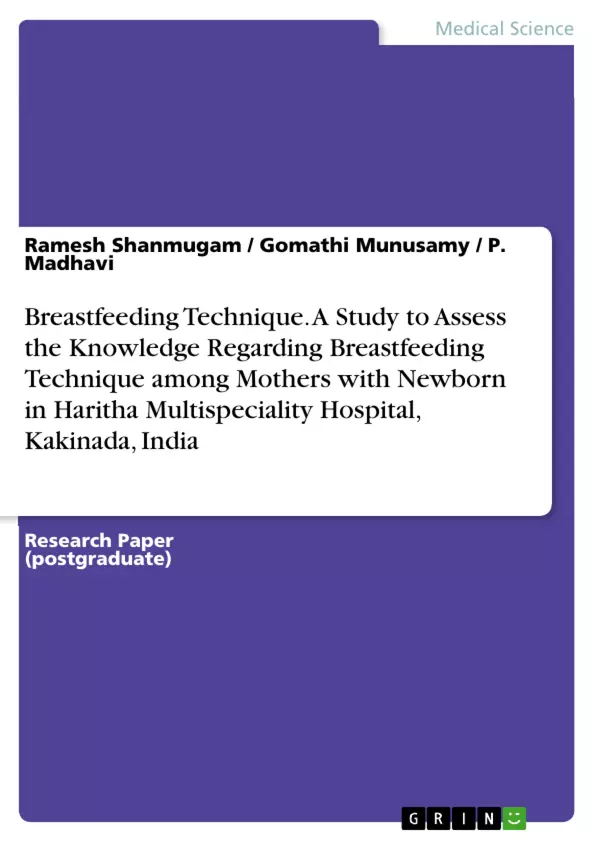In this book dealt with Breastfeeding provides physical contact which improves the bonding between mother and the baby. Breastfeeding is highly beneficial to mothers too; it is known to decrease the risk of type 2 diabetes mellitus, and postpartum depression. Breastfeeding mothers experience less breast discomfort and regain their pre-pregnancy status far more rapidly than the non-lactating mothers. Breastfeeding mothers have decreased postpartum blood loss and more rapid involution of the uterus. Continued breastfeeding leads to increased child spacing secondary to lactational amenorrhea. A mother with a newborn should have adequate knowledge on Breastfeeding and its proper technique so as to exploit its innumerous benefits.
This research work is an outstanding, useful for clinical practice and future similar work in community settings.
Table of Contents
- Preface
- Methods
- Results
- Interpretation & Conclusion
Objectives and Key Themes
This book aims to assess the knowledge of mothers regarding breastfeeding techniques and explore the association between demographic variables and breastfeeding knowledge. It also seeks to develop a health educational module on breastfeeding techniques.
- Knowledge of breastfeeding techniques among mothers.
- Association between demographic factors and breastfeeding knowledge.
- Development of a health educational module on breastfeeding.
- Impact of education level on breastfeeding knowledge.
- Importance of breastfeeding for both mother and child.
Chapter Summaries
Preface: This section provides background information on the study, stating that it employed a descriptive survey approach to assess knowledge of breastfeeding techniques among mothers with newborns at Haritha Multispeciality Hospital in Kakinada, India. The objectives outlined are to assess this knowledge, determine the association between demographic variables and breastfeeding knowledge, and create a health educational self-instructional module on breastfeeding. The study utilizes Pender's health promotion model as its conceptual framework.
Methods: This chapter details the methodology of the study. A structured interview schedule was used to assess mothers' knowledge of breastfeeding techniques. The data was collected from Haritha Multispeciality Hospital, Kakinada, following a pilot study. Purposive sampling was used to select 60 mothers, and data analysis involved descriptive and inferential statistics. The rigorous methodology ensures reliable data collection and analysis for a sound conclusion. The choice of purposive sampling indicates a focus on specific characteristics within the population.
Results: The results of the study showed an overall knowledge score of 59%, with a mean of 12.3 and a standard deviation of 2.25. Significant differences in breastfeeding knowledge were found only concerning education levels. Educated mothers demonstrated significantly better knowledge than uneducated mothers, highlighting the critical role of education in breastfeeding practices. This finding underscores the importance of targeted interventions to address knowledge gaps among uneducated mothers.
Interpretation & Conclusion: The study concludes that a majority of mothers have inadequate knowledge regarding breastfeeding techniques. This finding emphasizes the need to provide education and guidance on proper breastfeeding techniques to prevent premature cessation of breastfeeding. The implication is clear: improved education can positively impact breastfeeding duration and outcomes. This section directly relates the findings back to the study's objectives and overall significance.
Keywords
Breastfeeding, breastfeeding techniques, maternal knowledge, demographic factors, health education, newborn, India, educational module, lactational amenorrhea, postpartum depression.
Frequently Asked Questions: A Study on Breastfeeding Knowledge Among Mothers in India
What is the main focus of this study?
This study assesses the knowledge of breastfeeding techniques among mothers in India, explores the association between demographic variables and breastfeeding knowledge, and develops a health educational module on breastfeeding techniques. The study uses a descriptive survey approach and utilizes Pender's health promotion model as its conceptual framework.
What methods were used in this research?
The study employed a structured interview schedule to collect data from 60 mothers at Haritha Multispeciality Hospital in Kakinada, India, using purposive sampling. Data analysis involved descriptive and inferential statistics. A pilot study was conducted prior to the main data collection.
What were the key findings of the study?
The study found an overall knowledge score of 59% regarding breastfeeding techniques (mean of 12.3, standard deviation of 2.25). Significant differences in breastfeeding knowledge were observed only in relation to education levels, with educated mothers demonstrating significantly better knowledge.
What are the main conclusions and implications of the study?
The study concludes that a significant portion of mothers have inadequate knowledge of breastfeeding techniques. This highlights the need for improved education and guidance on proper breastfeeding practices to prevent premature cessation of breastfeeding and improve breastfeeding duration and outcomes. The developed educational module aims to address this knowledge gap.
What demographic factors were considered?
While the report details that an association between demographic factors and breastfeeding knowledge was explored, it only explicitly mentions education level as showing a statistically significant relationship with breastfeeding knowledge. Further details on other demographic factors and their analysis are not provided in this summary.
What is the significance of the study's findings?
The findings underscore the importance of targeted educational interventions, particularly for mothers with lower levels of education, to improve breastfeeding practices and promote better health outcomes for both mothers and their infants. The results contribute to a better understanding of breastfeeding knowledge gaps and inform the development of effective health education strategies.
What is the structure of the provided document?
The document includes a table of contents, a statement of objectives and key themes, chapter summaries (Preface, Methods, Results, Interpretation & Conclusion), and a list of keywords. This provides a comprehensive overview of the study's design, execution, findings, and conclusions.
Where was the study conducted?
The study was conducted at Haritha Multispeciality Hospital in Kakinada, India.
What theoretical framework guided the study?
The study utilized Pender's health promotion model as its conceptual framework.
What keywords describe this study?
Keywords include: Breastfeeding, breastfeeding techniques, maternal knowledge, demographic factors, health education, newborn, India, educational module, lactational amenorrhea, postpartum depression.
- Quote paper
- Ramesh Shanmugam (Author), Gomathi Munusamy (Author), P. Madhavi (Author), 2015, Breastfeeding Technique. A Study to Assess the Knowledge Regarding Breastfeeding Technique among Mothers with Newborn in Haritha Multispeciality Hospital, Kakinada, India, Munich, GRIN Verlag, https://www.grin.com/document/1177379



